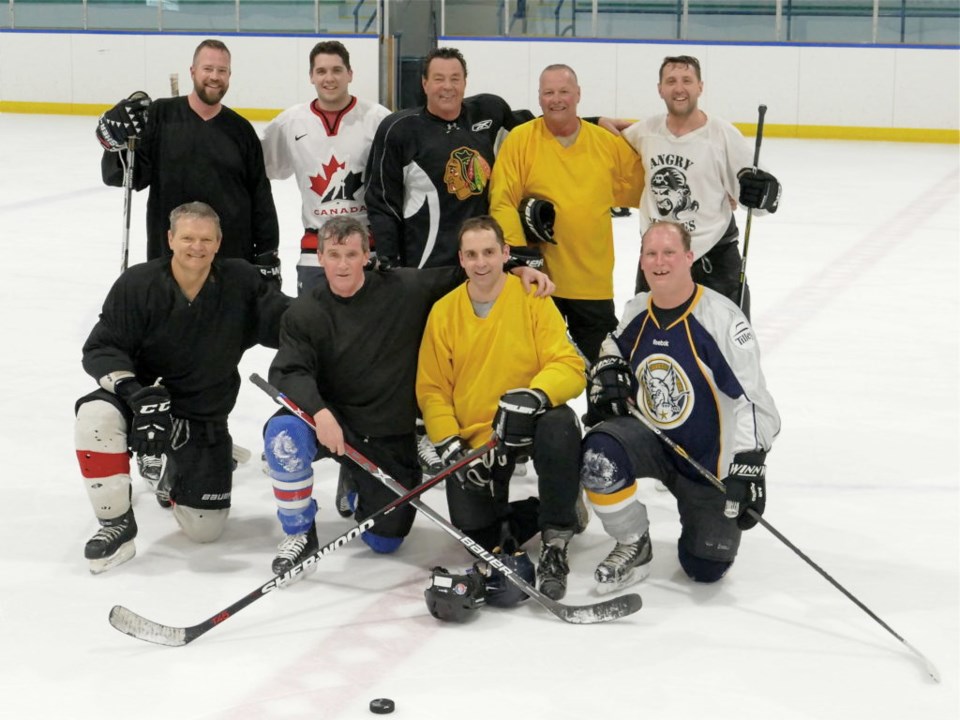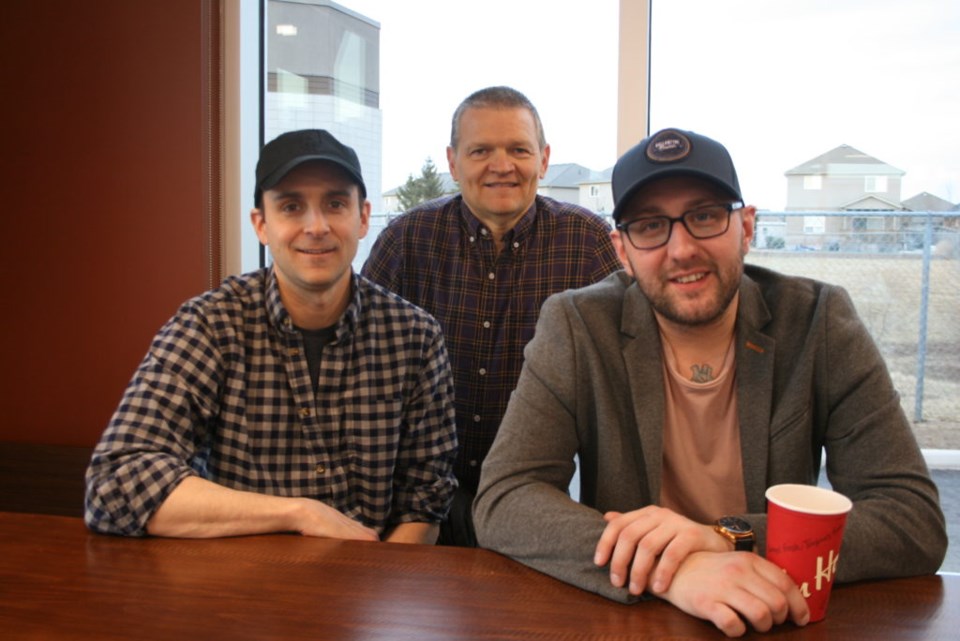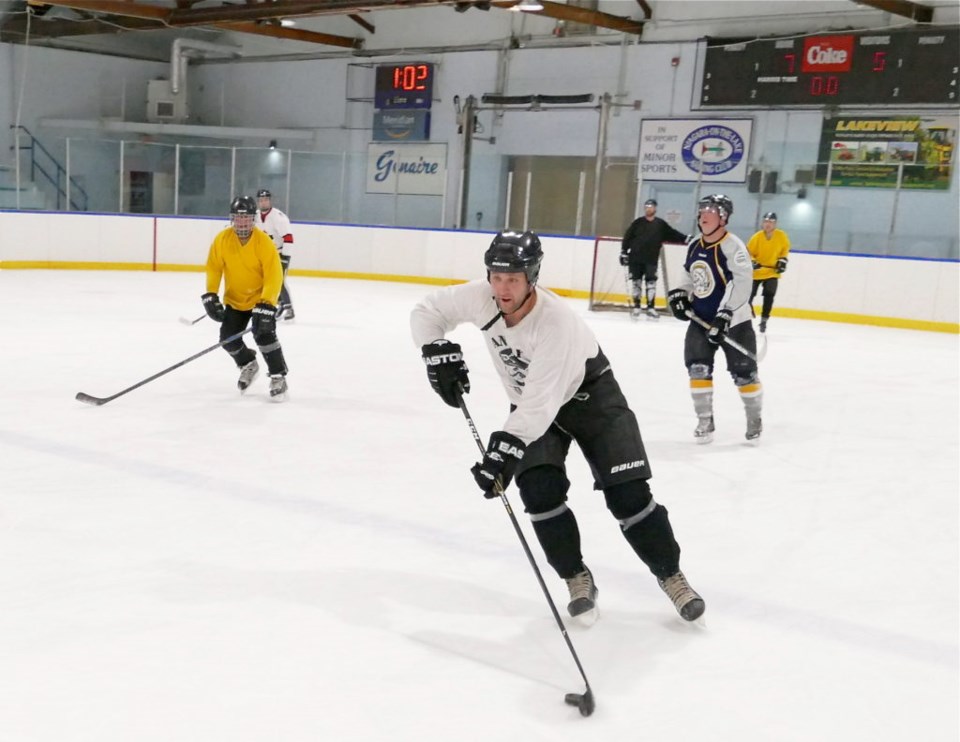
With the ice coming out of both arenas in Virgil this week, a certain group of hockey enthusiasts will be forced to find another daily routine for their lunch hour.
For more than 40 years, a form of shinny has been played at the Centennial Arena in Virgil. It’s a long-standing tradition, filling the noon-to-1 p.m. time slot Monday to Friday at the old barn. Though none of the originals come out regularly, it continues to attract lawyers, farmers, real estate agents, accountants, post-secondary students, business owners, and even a pastor, each year.
The NOTL Local met with the unofficial league executive on the eve of their final game of the season last week. Accountant Barry Boese, 54 years old, is the greeter; real estate agent Andrew Perrie is the publicist; and lawyer Dave Butler acts as the quiet historian. The three were excited to talk about their pastime, but also a bit melancholy facing their final session the following day.
They don’t like to call it “shinny.” To them, the correct term is “sponge puck hockey.” It’s played with a soft sponge puck, which changes the game immensely. In fact, as the hour progresses, the sponge soaks up the surface snow, increasing the drag and compelling the players to rely on their hands more than they would with a regular puck. Perrie says it’s forced him to develop better stick-handling skills over his 10 years playing in the informal league.
According to the “executive,” the daily sponge puck hockey league is the best-kept secret in Niagara. Up to 100 men (and some women) have shown up to play. They come from across the region and beyond. Ages have ranged from 18 to 74, and the skill level from those new to the game all the way to players with professional hockey experience.
Butler is one of those at the top rung of the experience ladder. The 43-year-old played university hockey at McGill in Montreal. Once a product of the Florida Panthers organization, he played in Corpus Christi and Lubbock, Texas, and Monroe, Louisiana, all in the Western Professional Hockey League, from 1998 to 2000. He also did time with four teams in the United Hockey League, finishing in Illinois as a member of the Rockford IceHogs in 2000-2001. A year in Germany capped off his pro career in 2003-2004.
He’s one of the regulars, who each pay $145 for the season. Others, who prefer less commitment, showing up when they can, bring $5 to drop in the bucket for each session.
It’s the only hockey Butler plays these days. He’s there Monday to Friday without fail. He points out that more well-known local pros Steve Ludzik and Zenon Konopka have also come out to give it a go, pushing the sponge puck across the ice.
On the other end of the spectrum, Butler talks about Gordon Ng. He showed up at the arena to watch one day and was hooked. New to Canada, he had never skated before. The guys convinced him to come out and Butler swears that over the eight years that have passed, Ng has become a really good player. Ng recently scoured Kijiji ads and ended up buying goalie equipment, which will make him even more valuable for the daily sessions next year.
Most days there are no goalies guarding the nets. On the day The Local went to watch, there were exactly 10 players, five per side, the teams chosen with a school-yard pick. All 10 were on the ice the entire hour.
Often there are not enough players for substitutions, points out 32-year-old Perrie.
“It’s a good workout,” adds Boese. “You really feel energized heading back to work after an hour on the ice.”
The only chance to have a rest is to take a turn minding the net. With the sponge puck, the prospect of playing goalie without full goaltending equipment is not quite as scary. As Perrie says, though there are no official rules, they “shoot at the goalie the way you’d like to be shot at.”
There is also no rule as to the equipment that must be worn, other than a helmet. Admittedly, most players wear full equipment. But often one or two can be observed skating around in sweat pants, hockey tape holding their shin pads in place. In the early days, says Butler, some of the farmers would play wearing their work gloves.
As the greeter, Boese will park himself by the arena entrance just before noon. He’s there to make sure anyone stopping by is invited to stick around and give it a try. That’s basically what happened with Perrie when he moved back to Niagara from Edmonton.
Perrie was initially put off by the sponge puck, but he got used to it. He believes the puck is the reason some people show up once and don’t come back. He relates the story of one visitor who brought his own hard puck and proceeded to skate around the rink stick-handling that one while the rest of the guys played their game in the middle. That was the last they saw of him.
Boese only plays four days a week. That day of rest is to save up his energy for his weekly “hot tub league” game he plays elsewhere. Unlike that league, there’s no chance to share a beer with the guys after a sponge puck game — everyone heads back to work.
Like Butler, Perrie also plays Monday to Friday, adding an additional two night games to his weekly activity. But it’s the sponge puck games he looks forward to the most.
It’s clear in talking to the three of them they all love the game and the camaraderie the daily sessions bring. “There’s no pressure to perform well,” says Perrie, which can be a problem in more organized leagues.
They truly appreciate the fact the Town continues to reserve the noon time slot for the sponge puck games. When former Niagara-on-the-Lake parks and recreation director Clive Buist retired five years ago, they were worried his replacement might not see the value in the daily sessions.
To their relief, current parks and recreation manager Kevin Turcotte continued to make the ice available, and the game goes on.
Butler adds that “relationships do build between the players over time.” In fact, Boese’s sons have both done work on Butler’s house and Perrie is getting set to list Butler’s mother’s house in the next few days.
Last week may be Butler’s swan song, at least as a regular. He’s been accepted into law school in New York State and will be moving there later this year.
With the ice gone now, they will continue to “chirp” each other on their Facebook chat group reserved for the sponge puck participants.
Rumour has it that film and TV director Michael Pohorly, who now lives in Vancouver, checks in on the chat once in awhile. He’s worked on Prison Break and Hannibal, as well as feature films The Uninvited and White Chicks. The NOTL native hasn’t played in Virgil in many years, but the guys say he still follows the group chat and chimes in every now and then.
After last Friday’s game, they gathered at the NOTL Golf Club for an end-of-season celebration. You can be sure that a lot of talk that day focused on next September, when a fresh sheet of ice will be laid down. Boese and Perrie, and anyone else who can make it, will be at the arena at noon that first day, ready for the first of six months of daily sponge puck workouts.

